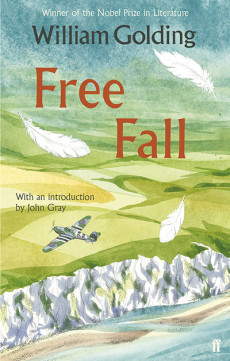'My yesterdays walk with me. They keep step, they are grey faces that peer over my shoulder'.

Free Fall
Sammy Mountjoy is swept into World War II and somehow, somewhere, he loses his freedom, the faculty of freewill ‘that cannot be debated but only experienced, like a colour or the taste of potatoes’. As he retraces his life in an effort to discover why he no longer has the power to choose and decide for himself, the narrative moves between England and a prisoner-of-war camp in Germany. He begins to realise what man can be and what he has gradually made of himself through his own choices. But did those accumulated choices also begin to deprive him of his free will?
‘Free Fall is an inquiry into some of the deepest human questions, but it also recreates a particular time and place – the sexually repressed, class-bound England of the thirties, moving uncertainly towards war – and the life of a particular human being, a fictive hybrid that includes much of the author himself’. – John Gray
'I set out to write a patternless novel'.
Timeline
Alec Golding
Golding’s father (Albert) Alec Golding was the basis for the character of Nick Shales in Free Fall. Alec died in December 1958 after Golding wrote the […]
Resources
Rotten Row
In Free Fall, Sammy and his ‘Ma’ live on Rotten Row, ‘right in the heart of the Garden of England’; ‘a slum’ with a wooden […]

News & Articles
Final four new editions published
The final four editions of Faber’s reissue of William Golding’s classic novels are now published! The books feature striking new covers and The Paper Men and The […]
'Free Fall is an inquiry into some of the deepest human questions'.
John Gray
'Words may, through the devotion, the skill, the passion and the luck of writers, prove to be the most powerful thing in the world'.
William Golding, Nobel Lecture, 1983